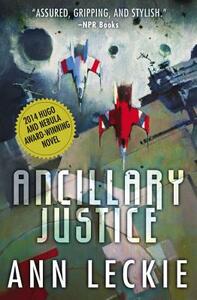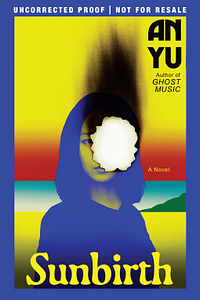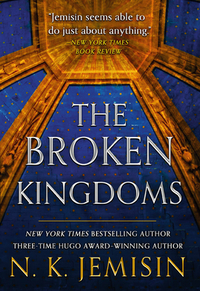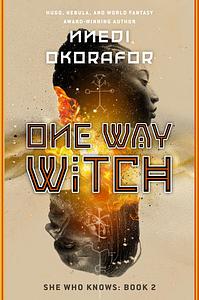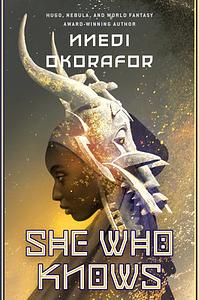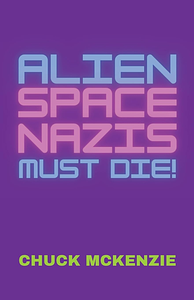You need to sign in or sign up before continuing.
Take a photo of a barcode or cover
existentialhell's Reviews (79)
Hester is exhausting in that banal, 2010s-Lena Dunham kind of way. Sociopathy isn't inherently more compelling in a woman, but this book really wants you to think so. Patrick Bateman works as a character because his narrative has opinions about what and who he represents and expresses them in an interesting way. Bad Nature is the illusion of depth; a mirage on the road to introspection most of us passed with a learner's permit and a 9 o'clock curfew.
adventurous
tense
medium-paced
Plot or Character Driven:
A mix
Strong character development:
Yes
Loveable characters:
Complicated
Diverse cast of characters:
Yes
Flaws of characters a main focus:
Yes
A snappy space opera that tackles the horrors of colonialism— the colonizing force's means, motives, and who bears what guilt for unforgivable atrocity.
There are moments where the pacing stuttered and characters whose involvement felt occasionally rushed or forced, but the premise and rich worldbuilding kept me engaged all the way through. I'll be picking up Ancillary Sword when I have the chance!
There are moments where the pacing stuttered and characters whose involvement felt occasionally rushed or forced, but the premise and rich worldbuilding kept me engaged all the way through. I'll be picking up Ancillary Sword when I have the chance!
challenging
mysterious
reflective
tense
slow-paced
Plot or Character Driven:
Character
Strong character development:
Complicated
Loveable characters:
Complicated
Diverse cast of characters:
No
Flaws of characters a main focus:
Yes
SUNBIRTH is a cool, contemplative breath on your front porch. The kind you draw in after midnight and a bad dream, the darkness stirring in its shallow wake. It's raining. You, lost in thought, hardly notice.
Gently speculative and starkly poetic. An Yu's latest work sits with the reader like an estranged friend ruminating on the nature of grief, egoism, collective identity, and what it means to truly know another person. An Yu neatly sidesteps any moralism in favor of richly shadowed questions and inconclusive thoughts even as our main characters wax (or wane) obstinate in their perspectives. The sun recedes, the Beacons rise, and the buses still run. What is it to live for yourself?
Truly gorgeous. I've cherished this time in Five Poems Lake.
[Thank you, Riverhead Books and NetGalley, for providing this eARC in exchange for my honest review.]
Gently speculative and starkly poetic. An Yu's latest work sits with the reader like an estranged friend ruminating on the nature of grief, egoism, collective identity, and what it means to truly know another person. An Yu neatly sidesteps any moralism in favor of richly shadowed questions and inconclusive thoughts even as our main characters wax (or wane) obstinate in their perspectives. The sun recedes, the Beacons rise, and the buses still run. What is it to live for yourself?
Truly gorgeous. I've cherished this time in Five Poems Lake.
[Thank you, Riverhead Books and NetGalley, for providing this eARC in exchange for my honest review.]
Moderate: Sexual assault
adventurous
emotional
hopeful
reflective
slow-paced
Plot or Character Driven:
Character
Strong character development:
Yes
Loveable characters:
No
Diverse cast of characters:
Yes
Flaws of characters a main focus:
Yes
[Thank you to Harlequin Trade Publishing and NetGalley for providing this eARC in exchange for my honest review.]
Beasts of Carnaval left me disappointed. Its premise and themes are as compelling as the vibrant aesthetics of Rosália Rodrigo's fantasy-Taíno culture, but the story's meandering pace and underdeveloped plot flattened most opportunities to connect to the characters or the novel's broader world.
Beasts of Carnaval follows the journey of one Sofía, a freedwoman who sets off on a daring mission to locate and rescue her twin brother. Sol, for his part, disappeared to Isla Bestia five years ago alongside their enslaver, tobacco plantation owner Don Reynaldo de Esperanza into the feverish gluttony of Carnaval. Together with the Don's only daughter, Adelina, Sofía braves pseudo-Victorian high society, bustles, endless intoxicants, and colonialism's lethal legacy in her search for answers. What a setup!
But Sofía's utterly unprepared for Isla Bestia's glittering hellscape and this is where the book's framework starts to shudder. Having a scrappy, no-nonsense heroine in way over her head can make for a deeply satisfying narrative if the reader is allowed to see the story's broader contours as the characters do (or even before); we are not afforded that here. Sofía is smart but clueless and compulsively defiant. Which, this is decently consistent characterization; but it periodically leaves the reader adrift in a sea of empty threats and stalled momentum, waiting for the doldrums to pass. The slow, foggy plotting is diluted by pretty but saccharine language, and Sofía's needlessly dense inner monologue quickly becomes tiresome.
The overwriting is truly my main gripe. It feels like the narrative doesn't trust the audience with subtext or nuance and so spends an excess 60-80 pages reiterating basic themes in excruciating triplicate. Biting commentaries are defanged by paragraphs of over-explanation. Sofía's slogging inner monologue borders on alienating at points. No insightful implication is allowed to stand on its own. Character beats are almost exclusively told, rarely shown. So many genuinely excellent ideas drowning in needless words. I craved nothing from work so much as brevity.
While I appreciate Beasts of Carnaval for tackling decolonization, collective and individual cultural identity, paper genocide, the horrors of white supremacy, righteous retribution, and more with such clear passion and care, I was ultimately underwhelmed by the execution. I would still recommend this book to certain avid readers craving a colorful anticolonial fantasy, but with heavy caveats. As for me, I'm grateful for the opportunity to have witnessed the Taike'ri's celebration-as-resistance; but I won't be coming back.
Beasts of Carnaval left me disappointed. Its premise and themes are as compelling as the vibrant aesthetics of Rosália Rodrigo's fantasy-Taíno culture, but the story's meandering pace and underdeveloped plot flattened most opportunities to connect to the characters or the novel's broader world.
Beasts of Carnaval follows the journey of one Sofía, a freedwoman who sets off on a daring mission to locate and rescue her twin brother. Sol, for his part, disappeared to Isla Bestia five years ago alongside their enslaver, tobacco plantation owner Don Reynaldo de Esperanza into the feverish gluttony of Carnaval. Together with the Don's only daughter, Adelina, Sofía braves pseudo-Victorian high society, bustles, endless intoxicants, and colonialism's lethal legacy in her search for answers. What a setup!
But Sofía's utterly unprepared for Isla Bestia's glittering hellscape and this is where the book's framework starts to shudder. Having a scrappy, no-nonsense heroine in way over her head can make for a deeply satisfying narrative if the reader is allowed to see the story's broader contours as the characters do (or even before); we are not afforded that here. Sofía is smart but clueless and compulsively defiant. Which, this is decently consistent characterization; but it periodically leaves the reader adrift in a sea of empty threats and stalled momentum, waiting for the doldrums to pass. The slow, foggy plotting is diluted by pretty but saccharine language, and Sofía's needlessly dense inner monologue quickly becomes tiresome.
The overwriting is truly my main gripe. It feels like the narrative doesn't trust the audience with subtext or nuance and so spends an excess 60-80 pages reiterating basic themes in excruciating triplicate. Biting commentaries are defanged by paragraphs of over-explanation. Sofía's slogging inner monologue borders on alienating at points. No insightful implication is allowed to stand on its own. Character beats are almost exclusively told, rarely shown. So many genuinely excellent ideas drowning in needless words. I craved nothing from work so much as brevity.
While I appreciate Beasts of Carnaval for tackling decolonization, collective and individual cultural identity, paper genocide, the horrors of white supremacy, righteous retribution, and more with such clear passion and care, I was ultimately underwhelmed by the execution. I would still recommend this book to certain avid readers craving a colorful anticolonial fantasy, but with heavy caveats. As for me, I'm grateful for the opportunity to have witnessed the Taike'ri's celebration-as-resistance; but I won't be coming back.
emotional
reflective
slow-paced
Plot or Character Driven:
Character
Strong character development:
Yes
Loveable characters:
Yes
Diverse cast of characters:
Yes
Flaws of characters a main focus:
Yes
"Because we know what the silence cost, we no dey keep expensive quiets."
Eloghosa Osunde offers us character study after character study in vivid emotional Technicolor with his latest showing, Necessary Fiction. Unsteady and deeply impactful truths about queer Nigerian love, life, and the nature of humanity are framed in portraits of one precious chosen family. Lagos shifts in dreamlike fog; relationships bloom and fade; love endures. It's surreal, earnest, and often a bit overexposed. Aphorisms saturate the pages. I found myself longing for time to rest between portraits, between conversations, between weighty revelations that the characters simply tell one another as often as they experience them.
This book is best read in small doses, with space to reflect and reset before staring back into the sun.
[Thank you, Riverhead Books and NetGalley, for providing this eARC in exchange for my honest review.]
Eloghosa Osunde offers us character study after character study in vivid emotional Technicolor with his latest showing, Necessary Fiction. Unsteady and deeply impactful truths about queer Nigerian love, life, and the nature of humanity are framed in portraits of one precious chosen family. Lagos shifts in dreamlike fog; relationships bloom and fade; love endures. It's surreal, earnest, and often a bit overexposed. Aphorisms saturate the pages. I found myself longing for time to rest between portraits, between conversations, between weighty revelations that the characters simply tell one another as often as they experience them.
This book is best read in small doses, with space to reflect and reset before staring back into the sun.
[Thank you, Riverhead Books and NetGalley, for providing this eARC in exchange for my honest review.]
adventurous
lighthearted
medium-paced
Plot or Character Driven:
A mix
Strong character development:
Yes
Loveable characters:
Yes
Diverse cast of characters:
Yes
Flaws of characters a main focus:
Yes
A relatively light, mostly enjoyable read set about 10 years after the events of The Hundred Thousand Kingdoms.
Though the plot feels a bit slapdash at points, the worldbuilding and overall structure kept me more or less engaged. Oree is a smart, compelling protag that periodically falls pray to narrative-induced cluelessness. It's irritating the first few times. It's maddening by the last chapter. Not nearly enough for me to DNF but be prepared to see the back of your eye sockets pretty consistently.
Back to the plot a moment, my main complaint is that so much care is given to Oree and her "strange homeless man"'s relationship that the storyline sometimes feels more like a vehicle for their connection than a fully fleshed entity in its own right. The back cover's blurb promises mystery, a "nightmarish conspiracy". "Someone, somehow, is murdering godlings, leaving their desecration bodies all over the city." That's a great pitch! How can anyone killing a godling? Why? And, implied, how the hell do we stop them? The problem is that we only spend meaningful time with one of those murders (the first) and the rest the rest of the discoveries are accidental, incidental as we're swept along from crisis to crisis. It's not completely formless, but the revelations felt hollow and unsatisfying as a reader. The writing's bouncy enough keep the audience moving through the empty and this is it's saving grace.
I feel confident recommending The Fifth Season and The Broken Earth trilogy over this for your N.K. Jemisin longings (and who amongst us doesn't long for Jemisin's brilliance), but if you like some romance tendencies in your fantasy, I think this would make a nice, quickish read. Maybe tucked in the shadow of a beautiful tree?
Though the plot feels a bit slapdash at points, the worldbuilding and overall structure kept me more or less engaged. Oree is a smart, compelling protag that periodically falls pray to narrative-induced cluelessness. It's irritating the first few times. It's maddening by the last chapter. Not nearly enough for me to DNF but be prepared to see the back of your eye sockets pretty consistently.
Back to the plot a moment, my main complaint is that so much care is given to Oree and her "strange homeless man"'s relationship that the storyline sometimes feels more like a vehicle for their connection than a fully fleshed entity in its own right. The back cover's blurb promises mystery, a "nightmarish conspiracy". "Someone, somehow, is murdering godlings, leaving their desecration bodies all over the city." That's a great pitch! How can anyone killing a godling? Why? And, implied, how the hell do we stop them? The problem is that we only spend meaningful time with one of those murders (the first) and the rest the rest of the discoveries are accidental, incidental as we're swept along from crisis to crisis. It's not completely formless, but the revelations felt hollow and unsatisfying as a reader. The writing's bouncy enough keep the audience moving through the empty and this is it's saving grace.
I feel confident recommending The Fifth Season and The Broken Earth trilogy over this for your N.K. Jemisin longings (and who amongst us doesn't long for Jemisin's brilliance), but if you like some romance tendencies in your fantasy, I think this would make a nice, quickish read. Maybe tucked in the shadow of a beautiful tree?
Graphic: Death
Moderate: Sexual content, Violence
Minor: Body horror
dark
emotional
hopeful
reflective
sad
slow-paced
Plot or Character Driven:
Character
Strong character development:
Yes
Loveable characters:
Yes
Diverse cast of characters:
Yes
Flaws of characters a main focus:
Yes
[Thank you, DAW and NetGalley, for providing this eARC in exchange for my honest review.]
Nnedi Okorafor's One Way Witch meditates heavily on themes of becoming, grief and trauma, racial violence, the many kinds of love, and what it means to atone especially for those wronged. The tale's juju system and the Mystic Points far beyond it is captivating, threading weight and vitality through many painfully happy on-page years. West African cultures inspire each moment (each everything) with adoring fire. Most authors love their worlds in their way but rarely is that love so clearly radiant as in this, Najeeba's time between times. A perfect salt cube.
One Way Witch is the warm, shifting sand as you nap in the sun. It burns as it soothes, and then burns again. It's slow. Pensive. Najeeba, careful in her reckless way, reflects on her life (lives) and Okorafor invites the reader to do the same. I'm loathe to say more and mar the mirror for future readers—this is a story best heard unfiltered. Be still and be ready.
What I will say: I strongly recommend starting with Who Fears Death. Okorafor's seminal Africanfuturist novel is the foundation for Najeeba's own series even as book one, She Who Knows, breathes to life years before Onyesonwu sets out to change the world. Okorafor recommended it first, in the author's note, so you know it's real. Settle in. Let this world become home.
[Book-wide CW for rape and sexual assault.]
Nnedi Okorafor's One Way Witch meditates heavily on themes of becoming, grief and trauma, racial violence, the many kinds of love, and what it means to atone especially for those wronged. The tale's juju system and the Mystic Points far beyond it is captivating, threading weight and vitality through many painfully happy on-page years. West African cultures inspire each moment (each everything) with adoring fire. Most authors love their worlds in their way but rarely is that love so clearly radiant as in this, Najeeba's time between times. A perfect salt cube.
One Way Witch is the warm, shifting sand as you nap in the sun. It burns as it soothes, and then burns again. It's slow. Pensive. Najeeba, careful in her reckless way, reflects on her life (lives) and Okorafor invites the reader to do the same. I'm loathe to say more and mar the mirror for future readers—this is a story best heard unfiltered. Be still and be ready.
What I will say: I strongly recommend starting with Who Fears Death. Okorafor's seminal Africanfuturist novel is the foundation for Najeeba's own series even as book one, She Who Knows, breathes to life years before Onyesonwu sets out to change the world. Okorafor recommended it first, in the author's note, so you know it's real. Settle in. Let this world become home.
[Book-wide CW for rape and sexual assault.]
Graphic: Rape, Sexual assault
Moderate: Sexism, Slavery, Violence, Xenophobia
Minor: Genocide, Slavery, Suicidal thoughts, Suicide
adventurous
emotional
inspiring
mysterious
reflective
medium-paced
Plot or Character Driven:
A mix
Strong character development:
Yes
Loveable characters:
Yes
Diverse cast of characters:
Yes
Flaws of characters a main focus:
Yes
This novella is a delight. Fierce warmth and heartbreak blooms in the desert sands of a far-future that feels enchantingly close. Nnedi Okorafor is a masterful storyteller. Salt Roads and Dead Lakes shifting; a young girl and her sorcery coming of age together; these are the heart and start of the brilliant world that Okorafor has nurtured so carefully for years.
Author's love salts each page like a promise. Read She Who Knows.
Author's love salts each page like a promise. Read She Who Knows.
Graphic: Death, Hate crime, Misogyny, Racism, Sexism, Violence, Xenophobia, Death of parent, Outing
Moderate: Racism, Sexual content, Violence, Blood, Grief, Injury/Injury detail
Minor: Rape, Sexual violence, Trafficking, Alcohol, Sexual harassment
[Thanks to DAW books and NetGalley for offering this eARC in exchange for my honest review!]
Alright, I'm in a weird position, here. I DNFed Esperance by Adam Oyebanji before the halfway mark despite being thoroughly sold on the premise. Neo-noir Afrofuturist space thriller? We're checking a bunch of boxes! Tackling intergenerational trauma, enslavement, reparations? Weird bugs? Phenomenal, let's see it. I settled in for what promised to be a wild ride. And it was, just not in any of the ways I expected.
Racism and especially anti-Black racism is, of course, one of the story's core themes: its roots, who perpetuates it, and how, and why, and its myriad ripple effects across cultures and across time. We spend a great deal of time on racism in the United States thanks to our hard-boiled Chicago detective, Ethan Krol. and that's where I feel things start to go sideways.
From page one we see the narrative-relevant microaggressions from Krol and others that tell us Esperance's is a world of discrimination pretending that racial bigotry belongs to The Past. All fine and good, great mirror of our own world, but the problem is that the discrimination isn't confined to the plot. The way certain Black characters are described by the story, for example, is steeped in colorism. The sentence that first had me questioning everything: "Amadi Okoro's skin might have been onyx black, but if he'd been hanged the marks still would have been easy to see" (Location 180). One could argue that since Krol is our third-person POV in this scene that it helps set up up his character as casually racist, and that may even be the author's intention; but, it feels wildly out of step with subsequent intentionally racist lines and that ambiguity, which remains pervasive, is a significant problem for a novel with so much to say about such painful topics. I don't trust the book to be consistent, and that's a tough ask for me as a reader.
What's more, the intentionally bigoted moments are often underdone. This is part of a larger problem with great scene ideas being rushed or abandon altogther, but I digress. Charged conversations and scenes breeze by with little commentary from the characters or the book itself. Weird hair-related comments unacknowledged; Kroll's drive-by East Asian sexualization; all-around strange racist moments that would be much stronger if they told us anything about our characters as individual people. That's what I'm really craving: Why does Krol move through the world this way, other than trying incredibly hard to be Humphrey Bogart? I don't know, because the book seems far more interested in developing the plot than any of its characters.
That neglect is profoundly disappointing because I really want to connect with these characters! The set-up is fun, please give me any reason to care about Krol's health, his divorce, his prejudices, his personality, his pride, anything. Why is Abi the way she is, emotionally? Who is she outside of the plot? What's Holly's deal? I feel like I catch fleeting glimpses of these people, but they're just that: glimpses. Give me a reason to care, please!
I'm so conflicted. I see the bones of a great story, with plenty of crucial themes to explore. Oyebanji's love of noir shines so bright from the very first page. I wanted to love it, but the dissonant, shallow characters and inconsistent plotting left too much to be desired.
Alright, I'm in a weird position, here. I DNFed Esperance by Adam Oyebanji before the halfway mark despite being thoroughly sold on the premise. Neo-noir Afrofuturist space thriller? We're checking a bunch of boxes! Tackling intergenerational trauma, enslavement, reparations? Weird bugs? Phenomenal, let's see it. I settled in for what promised to be a wild ride. And it was, just not in any of the ways I expected.
Racism and especially anti-Black racism is, of course, one of the story's core themes: its roots, who perpetuates it, and how, and why, and its myriad ripple effects across cultures and across time. We spend a great deal of time on racism in the United States thanks to our hard-boiled Chicago detective, Ethan Krol. and that's where I feel things start to go sideways.
From page one we see the narrative-relevant microaggressions from Krol and others that tell us Esperance's is a world of discrimination pretending that racial bigotry belongs to The Past. All fine and good, great mirror of our own world, but the problem is that the discrimination isn't confined to the plot. The way certain Black characters are described by the story, for example, is steeped in colorism. The sentence that first had me questioning everything: "Amadi Okoro's skin might have been onyx black, but if he'd been hanged the marks still would have been easy to see" (Location 180). One could argue that since Krol is our third-person POV in this scene that it helps set up up his character as casually racist, and that may even be the author's intention; but, it feels wildly out of step with subsequent intentionally racist lines and that ambiguity, which remains pervasive, is a significant problem for a novel with so much to say about such painful topics. I don't trust the book to be consistent, and that's a tough ask for me as a reader.
What's more, the intentionally bigoted moments are often underdone. This is part of a larger problem with great scene ideas being rushed or abandon altogther, but I digress. Charged conversations and scenes breeze by with little commentary from the characters or the book itself. Weird hair-related comments unacknowledged; Kroll's drive-by East Asian sexualization; all-around strange racist moments that would be much stronger if they told us anything about our characters as individual people. That's what I'm really craving: Why does Krol move through the world this way, other than trying incredibly hard to be Humphrey Bogart? I don't know, because the book seems far more interested in developing the plot than any of its characters.
That neglect is profoundly disappointing because I really want to connect with these characters! The set-up is fun, please give me any reason to care about Krol's health, his divorce, his prejudices, his personality, his pride, anything. Why is Abi the way she is, emotionally? Who is she outside of the plot? What's Holly's deal? I feel like I catch fleeting glimpses of these people, but they're just that: glimpses. Give me a reason to care, please!
I'm so conflicted. I see the bones of a great story, with plenty of crucial themes to explore. Oyebanji's love of noir shines so bright from the very first page. I wanted to love it, but the dissonant, shallow characters and inconsistent plotting left too much to be desired.
lighthearted
slow-paced
Plot or Character Driven:
A mix
Strong character development:
No
Loveable characters:
No
Diverse cast of characters:
No
Flaws of characters a main focus:
Yes
[Big thanks to BookBuzz,net, Daft Notions, and NetGalley for providing this ARC in exchange for my honest review!]
A breezy little read about killing space Nazis, base instincts, and the nature of reality.
Alien Space Nazis Must Die! is a tough letdown. It wants to land somewhere between Austin Powers, Ready Player One, and Indiana Jones—an aim I admire from a deep crouch as the shots miss spectacularly. I'm so bummed! I was ready for a campy, anti-fascist Aussie comedy and instead I got rough world-building refmats for the actual first draft you go on to write. More telling than showing, occasional almost-chuckle humor, and an unsatisfying ending given the questions our characters at least bounce off of. The conclusion is actually the most engaging part, though, as it at least subverts the audience's expectations. To what end? Who knows! The novella has no interest in exploring its own claims.
I almost wish ASNMD! had gone for a Death With Dignity commentary—it'd be a hell of a lot more compelling, and the basic setup is there. But hey, it's 64 pages, read it and let me know if you agree!
A breezy little read about killing space Nazis, base instincts, and the nature of reality.
Alien Space Nazis Must Die! is a tough letdown. It wants to land somewhere between Austin Powers, Ready Player One, and Indiana Jones—an aim I admire from a deep crouch as the shots miss spectacularly. I'm so bummed! I was ready for a campy, anti-fascist Aussie comedy and instead I got rough world-building refmats for the actual first draft you go on to write. More telling than showing, occasional almost-chuckle humor, and an unsatisfying ending given the questions our characters at least bounce off of. The conclusion is actually the most engaging part, though, as it at least subverts the audience's expectations. To what end? Who knows! The novella has no interest in exploring its own claims.
I almost wish ASNMD! had gone for a Death With Dignity commentary—it'd be a hell of a lot more compelling, and the basic setup is there. But hey, it's 64 pages, read it and let me know if you agree!

